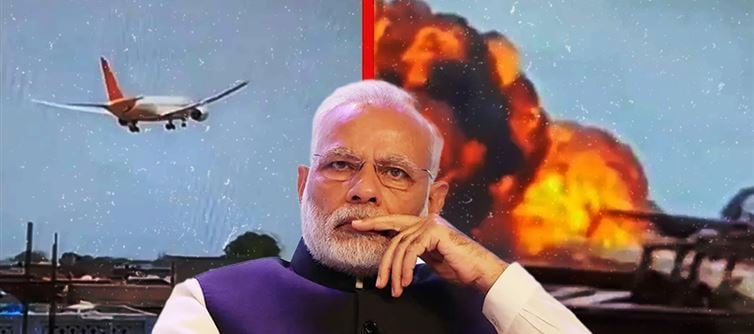
The tragic air india Boeing 787 crash in ahmedabad on june 12, 2025, has reignited a heated political and economic debate in India, with a tweet by lawyer and social media commentator mohit chauhan (@mohitlaws) at the center of the controversy. The tweet questions the decision by prime minister Narendra Modi’s government to privatize air india, contrasting it with the state-owned status of several global airlines. As investigations into the crash that claimed 241 lives continue, the post has sparked a flurry of responses, ranging from support to sharp criticism, reflecting deep divisions over the privatization policy.
Mohit Chauhan’s tweet highlights that major international airlines such as Emirates, air China, qatar Airways, Etihad Airways, and singapore airlines are government-owned, suggesting that state control can sustain successful aviation enterprises. The tweet states:
“Emirates is a govt owned airline. air China is a govt owned airline. qatar Airways is a govt owned airline. Etihad Airways is a govt owned airline. singapore airlines is a govt owned airline. But narendra modi privatized air india in the name of better services. #planecrash”
The inclusion of the hashtag #planecrash appears to link the privatization decision to the recent ahmedabad disaster, implying that retaining government ownership might have prevented the tragedy. The tweet has garnered significant attention, accumulating over 500 likes and triggering a robust thread of replies.
The tweet has elicited a polarized response. Supporters of Chauhan’s view, like @VivashwanSingh, argue that authoritarian states’ efficient management of their airlines contrasts with India’s privatization, which they claim neglected social equity concerns such as pilot diversity. Conversely, critics such as @ArindamRoy and @Hemantk47253461 defend the privatization, citing air India’s pre-2014 financial losses—estimated at ₹5,000 crore in 2014, rising to over ₹7,000 crore—under Congress-led governments. They assert that privatization, executed by the Tata Group in 2022, reduced losses by 40% and was a necessary step to revive a debt-ridden, inefficient entity.
The tweet taps into a longstanding debate about the role of government versus private enterprise in India’s public sector. air India’s privatization, completed in january 2022 when the Tata Group acquired an 84% stake for ₹18,000 crore, was hailed by the Modi government as a move to enhance efficiency and competitiveness. However, the ahmedabad crash has fueled opposition narratives, with the #planecrash hashtag amplifying calls for accountability. Critics like @BunnyySocialist point to post-privatization fines from the Directorate General of Civil Aviation (DGCA) for safety lapses, suggesting that privatization has not delivered the promised improvements.
Aviation analysts note that the success of government-owned airlines like Emirates and qatar Airways is tied to strategic investments and centralized control in resource-rich nations, a model less feasible in India’s diverse economic landscape. singapore airlines, often cited as a counterexample, is only partially state-owned (55% by Temasek Holdings) and operates with significant autonomy. Experts caution that linking the crash to privatization is premature without evidence, urging a focus on the ongoing investigation.
Mohit Chauhan’s tweet highlights that major international airlines such as Emirates, air China, qatar Airways, Etihad Airways, and singapore airlines are government-owned, suggesting that state control can sustain successful aviation enterprises. The tweet states:
“Emirates is a govt owned airline. air China is a govt owned airline. qatar Airways is a govt owned airline. Etihad Airways is a govt owned airline. singapore airlines is a govt owned airline. But narendra modi privatized air india in the name of better services. #planecrash”
The inclusion of the hashtag #planecrash appears to link the privatization decision to the recent ahmedabad disaster, implying that retaining government ownership might have prevented the tragedy. The tweet has garnered significant attention, accumulating over 500 likes and triggering a robust thread of replies.
The tweet has elicited a polarized response. Supporters of Chauhan’s view, like @VivashwanSingh, argue that authoritarian states’ efficient management of their airlines contrasts with India’s privatization, which they claim neglected social equity concerns such as pilot diversity. Conversely, critics such as @ArindamRoy and @Hemantk47253461 defend the privatization, citing air India’s pre-2014 financial losses—estimated at ₹5,000 crore in 2014, rising to over ₹7,000 crore—under Congress-led governments. They assert that privatization, executed by the Tata Group in 2022, reduced losses by 40% and was a necessary step to revive a debt-ridden, inefficient entity.
The tweet taps into a longstanding debate about the role of government versus private enterprise in India’s public sector. air India’s privatization, completed in january 2022 when the Tata Group acquired an 84% stake for ₹18,000 crore, was hailed by the Modi government as a move to enhance efficiency and competitiveness. However, the ahmedabad crash has fueled opposition narratives, with the #planecrash hashtag amplifying calls for accountability. Critics like @BunnyySocialist point to post-privatization fines from the Directorate General of Civil Aviation (DGCA) for safety lapses, suggesting that privatization has not delivered the promised improvements.
Aviation analysts note that the success of government-owned airlines like Emirates and qatar Airways is tied to strategic investments and centralized control in resource-rich nations, a model less feasible in India’s diverse economic landscape. singapore airlines, often cited as a counterexample, is only partially state-owned (55% by Temasek Holdings) and operates with significant autonomy. Experts caution that linking the crash to privatization is premature without evidence, urging a focus on the ongoing investigation.




 click and follow Indiaherald WhatsApp channel
click and follow Indiaherald WhatsApp channel